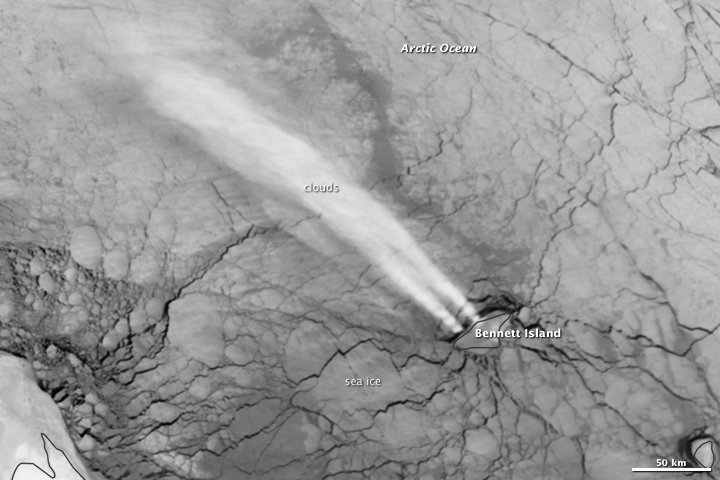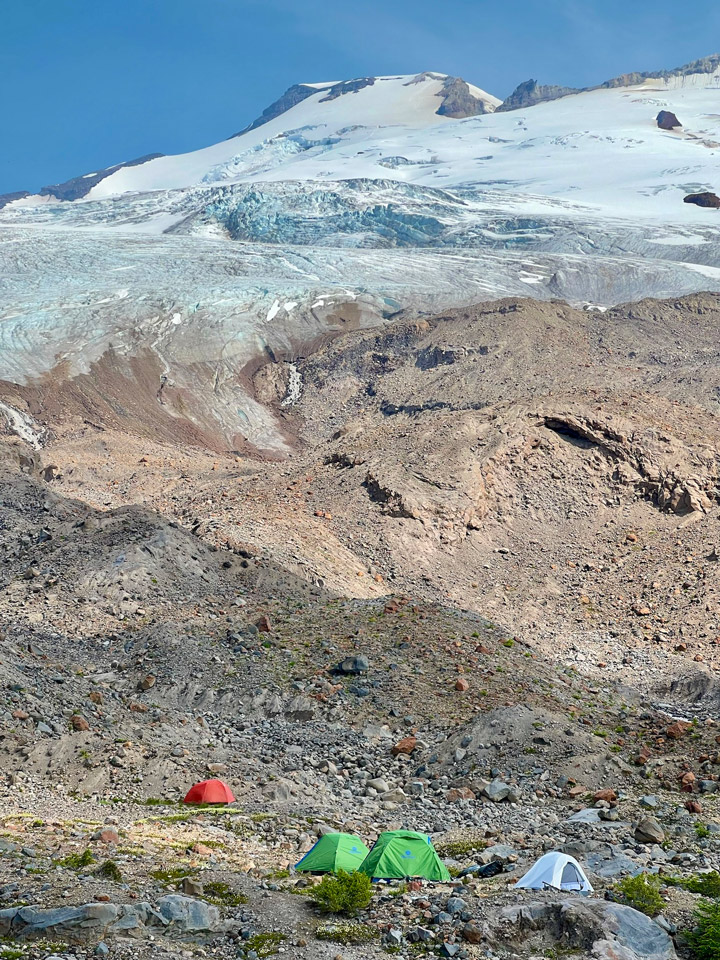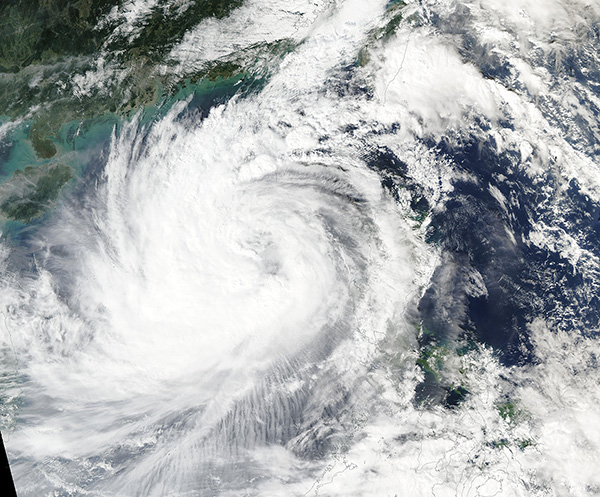Weather history miscellany
Re: Weather history miscellany
https://www.weather.gov/abr/This_Day_in ... ory_oct_21
1934: A severe windstorm lashed the northern Pacific coast. In Washington State, the storm claimed the lives of 22 persons, and caused 1.7 million dollars damage, mostly to timber. Winds, gusting to 87 mph at North Head, WA, produced waves twenty feet high on the Puget Sound. Click HERE for more information from the University of Washington.
1966: An avalanche of mud and rocks buries a school in Aberfan, Wales, killing 148 people, mostly young students. The elementary school was in a valley below where a mining operation dumped its waste. In the days leading up to October 21, there was heavy rain in the area. After five months of investigation and the deposition of more than 100 witnesses, it was determined that the tip had blocked the natural course of water down the hill. As the water was soaked into the tip, pressure built up inside until it cracked, with devastating results. The site of the disaster later became a park. Click HERE for more information from BBC
1988: Hurricane Joan, the last hurricane of the season, neared the coast of Nicaragua packing 125 mph winds. Joan claimed more than 200 lives as she moved over Central America, and total damage approached 1.5 billion dollars. Crossing more than 40 degrees of longitude, Hurricane Joan never strayed even one degree from the 12-degree north parallel. After crossing Central America into the Pacific, the cyclone was renamed Tropical Storm Miriam, with the system's dissipation occurring southwest of Mexico.
2010: Tornadoes do occur in South America. A tornado rampaged through Poza del Tigre, a northern Argentinean town, leaving at least six dead and over 100 wounded.
1934: A severe windstorm lashed the northern Pacific coast. In Washington State, the storm claimed the lives of 22 persons, and caused 1.7 million dollars damage, mostly to timber. Winds, gusting to 87 mph at North Head, WA, produced waves twenty feet high on the Puget Sound. Click HERE for more information from the University of Washington.
1966: An avalanche of mud and rocks buries a school in Aberfan, Wales, killing 148 people, mostly young students. The elementary school was in a valley below where a mining operation dumped its waste. In the days leading up to October 21, there was heavy rain in the area. After five months of investigation and the deposition of more than 100 witnesses, it was determined that the tip had blocked the natural course of water down the hill. As the water was soaked into the tip, pressure built up inside until it cracked, with devastating results. The site of the disaster later became a park. Click HERE for more information from BBC
1988: Hurricane Joan, the last hurricane of the season, neared the coast of Nicaragua packing 125 mph winds. Joan claimed more than 200 lives as she moved over Central America, and total damage approached 1.5 billion dollars. Crossing more than 40 degrees of longitude, Hurricane Joan never strayed even one degree from the 12-degree north parallel. After crossing Central America into the Pacific, the cyclone was renamed Tropical Storm Miriam, with the system's dissipation occurring southwest of Mexico.
2010: Tornadoes do occur in South America. A tornado rampaged through Poza del Tigre, a northern Argentinean town, leaving at least six dead and over 100 wounded.
Re: Weather history miscellany
NASA Earth Observatory
Water for a Desert Lake in Algeria
https://www.geonames.org/2476385/timmoudi.html
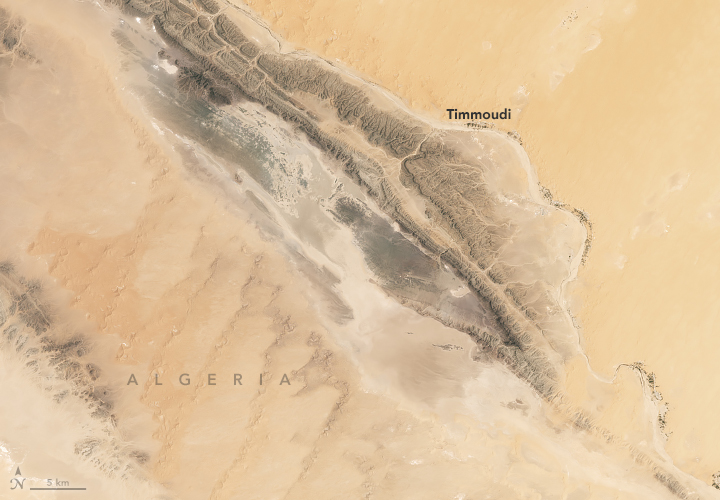 August 12, 2024 |
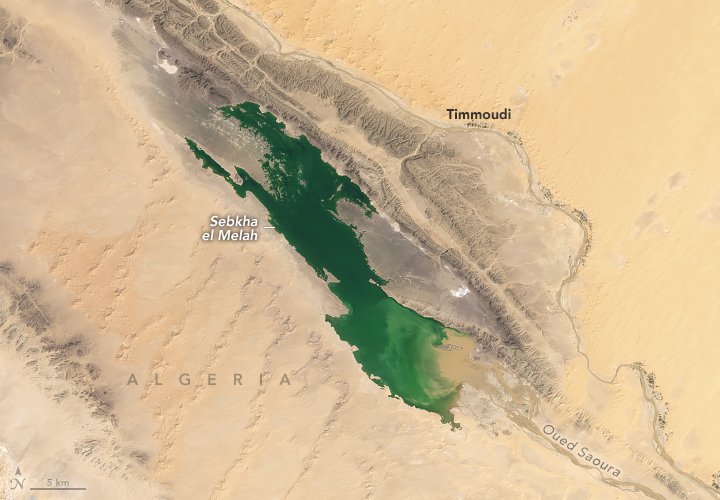 September 29, 2024 |
https://www.geonames.org/2476385/timmoudi.html
Re: Weather history miscellany
https://www.weather.gov/abr/This_Day_in ... ory_oct_22
1884: A drought which began in August, extended through September and continued until the last week October brought hardship to Northern, Central, and Eastern Alabama. The 22nd was the first day of general showers, and gentle rains fell from the 26th to the 29th.
1998: Tropical Depression Thirteen formed on October 22 over the southwestern the Caribbean Sea. By the 24th, this tropical depression became Hurricane Mitch. This hurricane would rapidly intensify over the next two days, reaching Category 5 strength on the 26th. Hurricane Mitch would end up being the second deadliest hurricane in the history of the Atlantic Ocean.
https://en.wikipedia.org/wiki/Hurricane_Mitch
1884: A drought which began in August, extended through September and continued until the last week October brought hardship to Northern, Central, and Eastern Alabama. The 22nd was the first day of general showers, and gentle rains fell from the 26th to the 29th.
1998: Tropical Depression Thirteen formed on October 22 over the southwestern the Caribbean Sea. By the 24th, this tropical depression became Hurricane Mitch. This hurricane would rapidly intensify over the next two days, reaching Category 5 strength on the 26th. Hurricane Mitch would end up being the second deadliest hurricane in the history of the Atlantic Ocean.
https://en.wikipedia.org/wiki/Hurricane_Mitch
- pommystuart
- Posts: 1862
- Joined: Mon May 18, 2020 12:48 am
- Location: Cooranbong, NSW, Australia.
Re: Weather history miscellany
Interesting.

Re: Weather history miscellany
https://www.weather.gov/abr/This_Day_in ... ory_oct_23
1878: One of the most severe hurricanes to affect eastern Virginia in the latter half of the 19th century struck on October 23, 1878. This storm moved rapidly northward from the Bahamas on October 22nd and hit the North Carolina coast late that same day moving at a forward speed of 40 to 50 mph. The storm continued northward passing through east central Virginia, Maryland and eastern Pennsylvania. The barometric pressure fell to 28.78". The five minute sustained wind reached 84 mph at Cape Henry. During the heaviest part of the gale, the wind at Kitty Hawk, North Carolina registered 100 mph. The instrument itself has finally blown away and therefore no further record was made. Click HERE for more information from the Weather Prediction Center.
1920: Famed research meteorologist Theodore Fujita, was born on this date in Kitakyushu City, Japan. Fujita, known as "Mr. Tornado" after developing the international standard for measuring tornado severity, also discovered microbursts.
1878: One of the most severe hurricanes to affect eastern Virginia in the latter half of the 19th century struck on October 23, 1878. This storm moved rapidly northward from the Bahamas on October 22nd and hit the North Carolina coast late that same day moving at a forward speed of 40 to 50 mph. The storm continued northward passing through east central Virginia, Maryland and eastern Pennsylvania. The barometric pressure fell to 28.78". The five minute sustained wind reached 84 mph at Cape Henry. During the heaviest part of the gale, the wind at Kitty Hawk, North Carolina registered 100 mph. The instrument itself has finally blown away and therefore no further record was made. Click HERE for more information from the Weather Prediction Center.
1920: Famed research meteorologist Theodore Fujita, was born on this date in Kitakyushu City, Japan. Fujita, known as "Mr. Tornado" after developing the international standard for measuring tornado severity, also discovered microbursts.
Re: Weather history miscellany
NASA Earth Observatory - October Puzzler
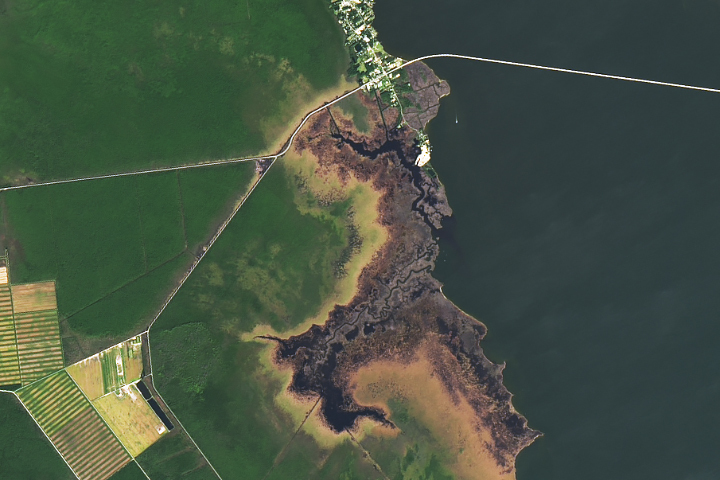
Every month on Earth Matters, we offer a puzzling satellite image. The October 2024 puzzler is shown above.
Your challenge is to tell us where it is, what we are looking at, and why it is interesting. Reply here.

Every month on Earth Matters, we offer a puzzling satellite image. The October 2024 puzzler is shown above.
Your challenge is to tell us where it is, what we are looking at, and why it is interesting. Reply here.
Re: Weather history miscellany
https://www.weather.gov/abr/This_Day_in ... ory_oct_24
1878: The Gale of 1878 was an intense Category 2 hurricane that was active between October 18 and October 25. It caused extensive damage from Cuba to New England. Believed to be the strongest storm to hit the Washington - Baltimore region since hurricane records began in 1851. Click HERE for more information from the Weather Prediction Center.
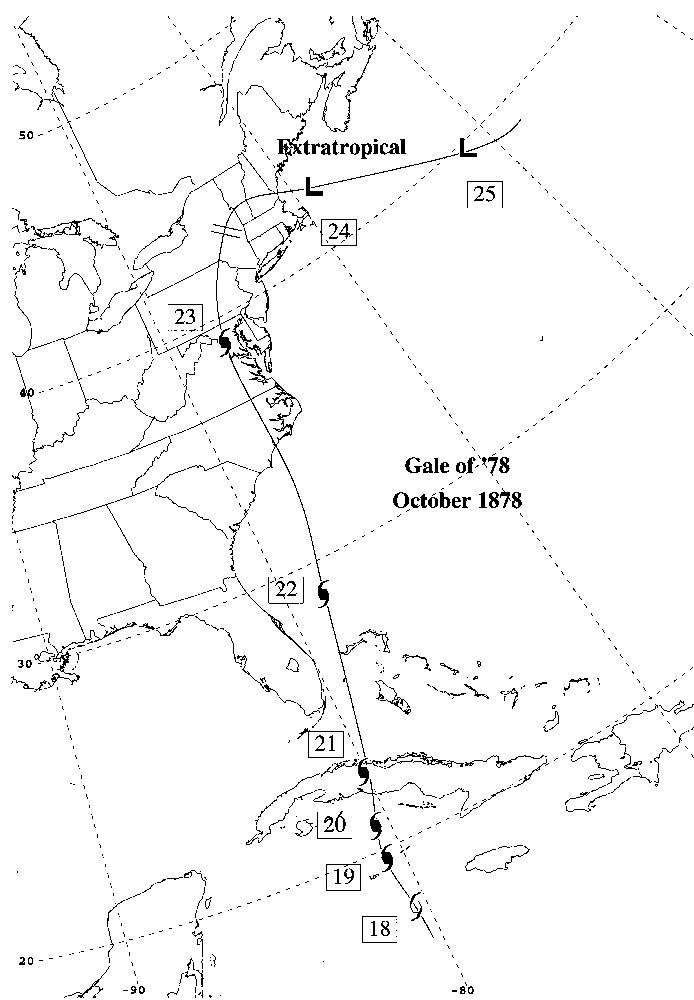
1878: The Gale of 1878 was an intense Category 2 hurricane that was active between October 18 and October 25. It caused extensive damage from Cuba to New England. Believed to be the strongest storm to hit the Washington - Baltimore region since hurricane records began in 1851. Click HERE for more information from the Weather Prediction Center.

Re: Weather history miscellany
https://www.weather.gov/abr/This_Day_in ... ory_oct_25
1918: The Canadian steamship Princess Sophia carrying miners from the Yukon and Alaska becomes stranded on Vanderbilt Reef. A strong northerly gale hampers rescue attempts the day before. The ship sinks on this day, killing the 268 passengers and 75 crewmen on board. Click HERE for images of Princess Sophia from Alaska's Digital Archives.
2008: A storm packing winds of more than 60 mph hits central Alberta. In Edmonton, the strongest October wind ever recorded reaches 64 mph, cutting power to 4,000. The winds blow free sheet metal, parts of billboards, garbage cans, and pieces of trees around the city.
1918: The Canadian steamship Princess Sophia carrying miners from the Yukon and Alaska becomes stranded on Vanderbilt Reef. A strong northerly gale hampers rescue attempts the day before. The ship sinks on this day, killing the 268 passengers and 75 crewmen on board. Click HERE for images of Princess Sophia from Alaska's Digital Archives.
2008: A storm packing winds of more than 60 mph hits central Alberta. In Edmonton, the strongest October wind ever recorded reaches 64 mph, cutting power to 4,000. The winds blow free sheet metal, parts of billboards, garbage cans, and pieces of trees around the city.
Re: Weather history miscellany
Our neighbour in Whitehorse was alive only because her grandmother and grandfather, who had booked passage on the Princess Sophia for that trip, decided not to take the ship that day.
Re: Weather history miscellany
https://www.weather.gov/abr/This_Day_in ... ory_oct_26
1952: There have been thousands of weather reconnaissance and research flights into hurricanes in the Atlantic and Pacific since the mid-1940s. There have been several close calls, but only four flights have been lost. A B-29 Super-fortress flight into Super Typhoon Wilma 350 miles east of Leyte in the Philippines disappeared on this date. No trace was ever found of the plane or crew. In the last report, the flight was in the Super typhoon's strongest winds, which were around 160 mph.
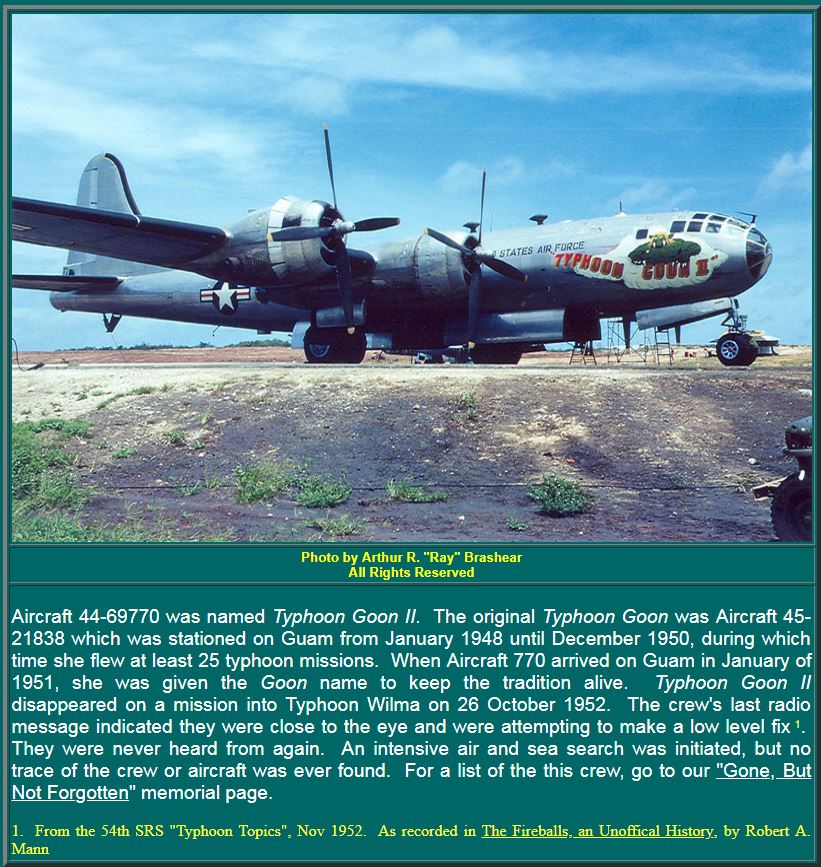
1998: Hurricane Mitch, the second deadliest hurricane in the Atlantic Ocean, reached Category 5 strength on this day.
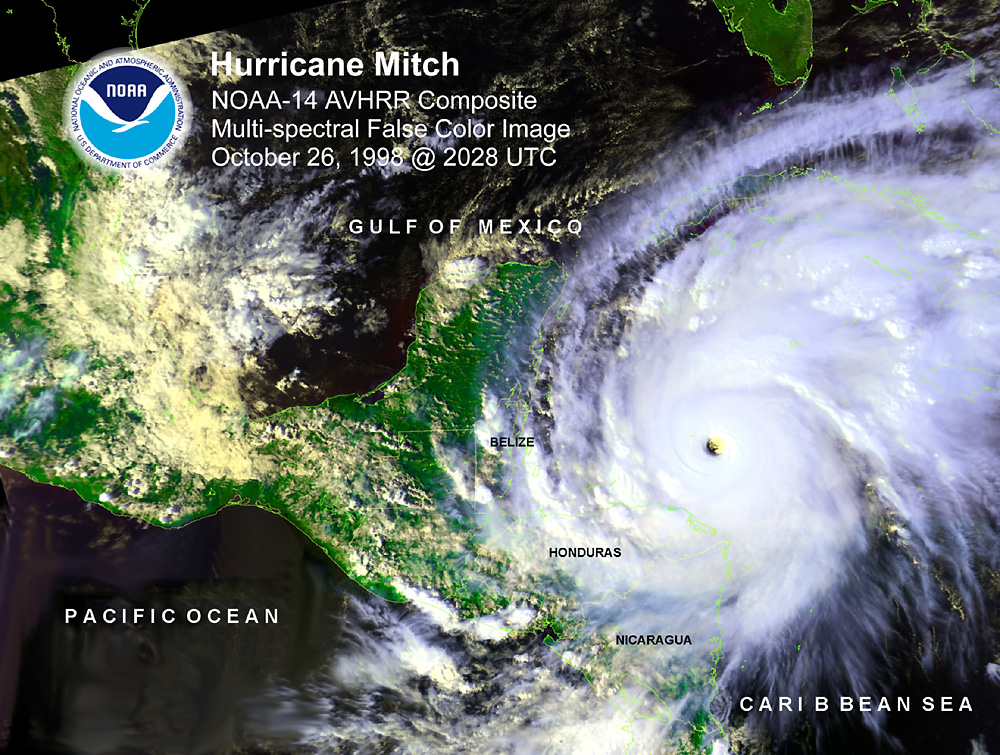
1952: There have been thousands of weather reconnaissance and research flights into hurricanes in the Atlantic and Pacific since the mid-1940s. There have been several close calls, but only four flights have been lost. A B-29 Super-fortress flight into Super Typhoon Wilma 350 miles east of Leyte in the Philippines disappeared on this date. No trace was ever found of the plane or crew. In the last report, the flight was in the Super typhoon's strongest winds, which were around 160 mph.

1998: Hurricane Mitch, the second deadliest hurricane in the Atlantic Ocean, reached Category 5 strength on this day.

Re: Weather history miscellany
https://www.weatherforyou.com/weather_history/10-27
1764 - A "very remarkable storm of snow with high winds" produced 22 inches at Rutland in central Massachusetts. (David Ludlum)
1962 - An early season winter storm over New England blanketed northern Maine with 7 to 16 inches of snow, and southeastern New England with up to 3 inches of snow. Worcester MA received a record 4.7 inches of snow. (The Weather Channel)
1988 - Low pressure brought snow and gale force winds to the Great Lakes Region, and snow and high winds to the north central U.S. Winds gusted to 47 mph at Lansing MI, and reached 55 mph at Pierre SD. (The National Weather Summary) (Storm Data)
1764 - A "very remarkable storm of snow with high winds" produced 22 inches at Rutland in central Massachusetts. (David Ludlum)
1962 - An early season winter storm over New England blanketed northern Maine with 7 to 16 inches of snow, and southeastern New England with up to 3 inches of snow. Worcester MA received a record 4.7 inches of snow. (The Weather Channel)
1988 - Low pressure brought snow and gale force winds to the Great Lakes Region, and snow and high winds to the north central U.S. Winds gusted to 47 mph at Lansing MI, and reached 55 mph at Pierre SD. (The National Weather Summary) (Storm Data)
Re: Weather history miscellany
https://www.weather.gov/abr/This_Day_in ... ory_oct_28
1846: In the spring of 1846, a group of nearly 90 emigrants left Springfield, Illinois, and headed west to California. The Donner party arrived at the Great Salt Lake and still needed to cross the Sierra Nevada Mountains late in the season. On this day, a heavy snowfall blocked the pass, thus trapping the emigrants. Only 45 of the original 89 emigrants reached California the following year. Click HERE for more information from the History Channel.
1846: In the spring of 1846, a group of nearly 90 emigrants left Springfield, Illinois, and headed west to California. The Donner party arrived at the Great Salt Lake and still needed to cross the Sierra Nevada Mountains late in the season. On this day, a heavy snowfall blocked the pass, thus trapping the emigrants. Only 45 of the original 89 emigrants reached California the following year. Click HERE for more information from the History Channel.
Re: Weather history miscellany
MODIS Image of the day
Drought along the Amazon and Tapajós Rivers
https://www.geonames.org/3386757/rio-tapajos.html

October 12, 2021 |

October 23, 2024 |
Drought along the Amazon and Tapajós Rivers
https://www.geonames.org/3386757/rio-tapajos.html
